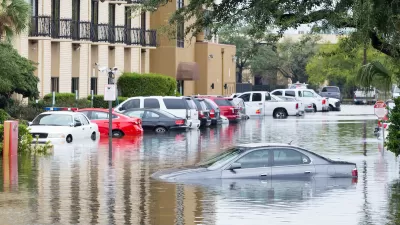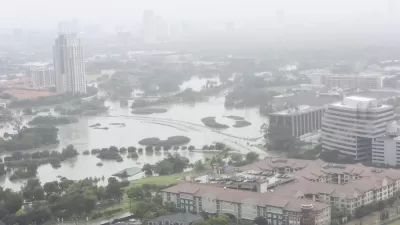Critics contend that New York's so-called resilience strategy doesn't go far enough in protecting the city's 520-mile-long coast and low-lying areas from the threats of rising seas and ever-more-severe storm flooding, reports Mireya Navarro.
While New York has engaged in some of the country's most aggressive efforts to understand, and help fend off, the effects of climate change, "critics say New York is moving too slowly to address the potential for
flooding that could paralyze transportation, cripple the low-lying
financial district and temporarily drive hundreds of thousands of people
from their homes."
Although the city is undertaking efforts to expand wetlands, install green roofs, and get property owners to move boilers to higher floors, critics such as Douglas Hill, an engineer with the Storm Surge Research Group at Stony Brook University, on Long Island, are concerned that, "They lack a sense of urgency about this."
"Instead of 'planning to be flooded,' as he put it, city, state and
federal agencies should be investing in protection like sea gates that
could close during a storm and block a surge from Long Island Sound and
the Atlantic Ocean into the East River and New York Harbor."
"Officials in New York caution that adapting a city of eight million
people to climate change is infinitely more complicated and that the
costs must be weighed against the relative risks of flooding," notes Navarro.
"'It's a million small changes that need to happen,' said Adam Freed,
until August the deputy director of the city's Office of Long-Term
Planning and Sustainability. 'Everything you do has to be a calculation
of the risks and benefits and costs you face.'"
"And in any case, Mr. Freed said, 'you can't make a climate-proof city.'"
FULL STORY: New York Is Lagging as Seas and Risks Rise, Critics Warn

Alabama: Trump Terminates Settlements for Black Communities Harmed By Raw Sewage
Trump deemed the landmark civil rights agreement “illegal DEI and environmental justice policy.”

Study: Maui’s Plan to Convert Vacation Rentals to Long-Term Housing Could Cause Nearly $1 Billion Economic Loss
The plan would reduce visitor accommodation by 25% resulting in 1,900 jobs lost.

Planetizen Federal Action Tracker
A weekly monitor of how Trump’s orders and actions are impacting planners and planning in America.

Wind Energy on the Rise Despite Federal Policy Reversal
The Trump administration is revoking federal support for renewable energy, but demand for new projects continues unabated.

Passengers Flock to Caltrain After Electrification
The new electric trains are running faster and more reliably, leading to strong ridership growth on the Bay Area rail system.

Texas Churches Rally Behind ‘Yes in God’s Back Yard’ Legislation
Religious leaders want the state to reduce zoning regulations to streamline leasing church-owned land to housing developers.
Urban Design for Planners 1: Software Tools
This six-course series explores essential urban design concepts using open source software and equips planners with the tools they need to participate fully in the urban design process.
Planning for Universal Design
Learn the tools for implementing Universal Design in planning regulations.
Caltrans
Smith Gee Studio
Institute for Housing and Urban Development Studies (IHS)
City of Grandview
Harvard GSD Executive Education
Toledo-Lucas County Plan Commissions
Salt Lake City
NYU Wagner Graduate School of Public Service





























